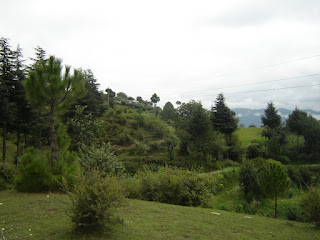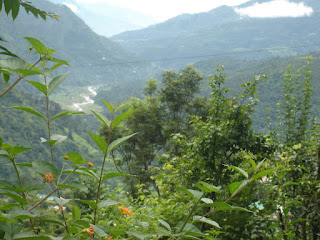If what we're watching on TV is indeed a revolution, then it has to be one of the more embarrassing and unintelligible ones of recent times. For now, whatever questions you may have about the Jan Lokpal Bill, here are the answers you're likely to get: tick the box — (a) Vande Mataram (b) Bharat Mata ki Jai (c) India is Anna, Anna is India (d) Jai Hind.
For completely different reasons, and in completely different ways, you could say that the Maoists and the Jan Lokpal Bill have one thing in common — they both seek the overthrow of the Indian State. One working from the bottom up, by means of an armed struggle, waged by a largely adivasi army, made up of the poorest of the poor. The other, from the top down, by means of a bloodless Gandhian coup, led by a freshly minted saint, and an army of largely urban, and certainly better off people. (In this one, the Government collaborates by doing everything it possibly can to overthrow itself.)
In April 2011, a few days into Anna Hazare's first “fast unto death,” searching for some way of distracting attention from the massive corruption scams which had battered its credibility, the Government invited Team Anna, the brand name chosen by this “civil society” group, to be part of a joint drafting committee for a new anti-corruption law. A few months down the line it abandoned that effort and tabled its own bill in Parliament, a bill so flawed that it was impossible to take seriously.
Then, on August 16th, the morning of his second “fast unto death,” before he had begun his fast or committed any legal offence, Anna Hazare was arrested and jailed. The struggle for the implementation of the Jan Lokpal Bill now coalesced into a struggle for the right to protest, the struggle for democracy itself. Within hours of this ‘Second Freedom Struggle,' Anna was released. Cannily, he refused to leave prison, but remained in Tihar jail as an honoured guest, where he began a fast, demanding the right to fast in a public place. For three days, while crowds and television vans gathered outside, members of Team Anna whizzed in and out of the high security prison, carrying out his video messages, to be broadcast on national TV on all channels. (Which other person would be granted this luxury?) Meanwhile 250 employees of the Municipal Commission of Delhi, 15 trucks, and six earth movers worked around the clock to ready the slushy Ramlila grounds for the grand weekend spectacle. Now, waited upon hand and foot, watched over by chanting crowds and crane-mounted cameras, attended to by India's most expensive doctors, the third phase of Anna's fast to the death has begun. “From Kashmir to Kanyakumari, India is One,” the TV anchors tell us.
While his means may be Gandhian, Anna Hazare's demands are certainly not. Contrary to Gandhiji's ideas about the decentralisation of power, the Jan Lokpal Bill is a draconian, anti-corruption law, in which a panel of carefully chosen people will administer a giant bureaucracy, with thousands of employees, with the power to police everybody from the Prime Minister, the judiciary, members of Parliament, and all of the bureaucracy, down to the lowest government official. The Lokpal will have the powers of investigation, surveillance, and prosecution. Except for the fact that it won't have its own prisons, it will function as an independent administration, meant to counter the bloated, unaccountable, corrupt one that we already have. Two oligarchies, instead of just one.
Whether it works or not depends on how we view corruption. Is corruption just a matter of legality, of financial irregularity and bribery, or is it the currency of a social transaction in an egregiously unequal society, in which power continues to be concentrated in the hands of a smaller and smaller minority? Imagine, for example, a city of shopping malls, on whose streets hawking has been banned. A hawker pays the local beat cop and the man from the municipality a small bribe to break the law and sell her wares to those who cannot afford the prices in the malls. Is that such a terrible thing? In future will she have to pay the Lokpal representative too? Does the solution to the problems faced by ordinary people lie in addressing the structural inequality, or in creating yet another power structure that people will have to defer to?
Meanwhile the props and the choreography, the aggressive nationalism and flag waving of Anna's Revolution are all borrowed, from the anti-reservation protests, the world-cup victory parade, and the celebration of the nuclear tests. They signal to us that if we do not support The Fast, we are not ‘true Indians.' The 24-hour channels have decided that there is no other news in the country worth reporting.
‘The Fast' of course doesn't mean Irom Sharmila's fast that has lasted for more than ten years (she's being force fed now) against the AFSPA, which allows soldiers in Manipur to kill merely on suspicion. It does not mean the relay hunger fast that is going on right now by ten thousand villagers in Koodankulam protesting against the nuclear power plant. ‘The People' does not mean the Manipuris who support Irom Sharmila's fast. Nor does it mean the thousands who are facing down armed policemen and mining mafias in Jagatsinghpur, or Kalinganagar, or Niyamgiri, or Bastar, or Jaitapur. Nor do we mean the victims of the Bhopal gas leak, or the people displaced by dams in the Narmada Valley. Nor do we mean the farmers in NOIDA, or Pune or Haryana or elsewhere in the country, resisting the takeover of the land.
‘The People' only means the audience that has gathered to watch the spectacle of a 74-year-old man threatening to starve himself to death if his Jan Lokpal Bill is not tabled and passed by Parliament. ‘The People' are the tens of thousands who have been miraculously multiplied into millions by our TV channels, like Christ multiplied the fishes and loaves to feed the hungry. “A billion voices have spoken,” we're told. “India is Anna.”
Who is he really, this new saint, this Voice of the People? Oddly enough we've heard him say nothing about things of urgent concern. Nothing about the farmer's suicides in his neighbourhood, or about Operation Green Hunt further away. Nothing about Singur, Nandigram, Lalgarh, nothing about Posco, about farmer's agitations or the blight of SEZs. He doesn't seem to have a view about the Government's plans to deploy the Indian Army in the forests of Central India.
He does however support Raj Thackeray's Marathi Manoos xenophobia and has praised the ‘development model' of Gujarat's Chief Minister who oversaw the 2002 pogrom against Muslims. (Anna withdrew that statement after a public outcry, but presumably not his admiration.)
Despite the din, sober journalists have gone about doing what journalists do. We now have the back-story about Anna's old relationship with the RSS. We have heard from Mukul Sharma who has studied Anna's village community in Ralegan Siddhi, where there have been no Gram Panchayat or Co-operative society elections in the last 25 years. We know about Anna's attitude to ‘harijans': “It was Mahatma Gandhi's vision that every village should have one chamar, one sunar, one kumhar and so on. They should all do their work according to their role and occupation, and in this way, a village will be self-dependant. This is what we are practicing in Ralegan Siddhi.” Is it surprising that members of Team Anna have also been associated with Youth for Equality, the anti-reservation (pro-“merit”) movement? The campaign is being handled by people who run a clutch of generously funded NGOs whose donors include Coca-Cola and the Lehman Brothers. Kabir, run by Arvind Kejriwal and Manish Sisodia, key figures in Team Anna, has received $400,000 from the Ford Foundation in the last three years. Among contributors to the India Against Corruption campaign there are Indian companies and foundations that own aluminum plants, build ports and SEZs, and run Real Estate businesses and are closely connected to politicians who run financial empires that run into thousands of crores of rupees. Some of them are currently being investigated for corruption and other crimes. Why are they all so enthusiastic?
Remember the campaign for the Jan Lokpal Bill gathered steam around the same time as embarrassing revelations by Wikileaks and a series of scams, including the 2G spectrum scam, broke, in which major corporations, senior journalists, and government ministers and politicians from the Congress as well as the BJP seem to have colluded in various ways as hundreds of thousands of crores of rupees were being siphoned off from the public exchequer. For the first time in years, journalist-lobbyists were disgraced and it seemed as if some major Captains of Corporate India could actually end up in prison. Perfect timing for a people's anti-corruption agitation. Or was it?
At a time when the State is withdrawing from its traditional duties and Corporations and NGOs are taking over government functions (water supply, electricity, transport, telecommunication, mining, health, education); at a time when the terrifying power and reach of the corporate owned media is trying to control the public imagination, one would think that these institutions — the corporations, the media, and NGOs — would be included in the jurisdiction of a Lokpal bill. Instead, the proposed bill leaves them out completely.
Now, by shouting louder than everyone else, by pushing a campaign that is hammering away at the theme of evil politicians and government corruption, they have very cleverly let themselves off the hook. Worse, by demonising only the Government they have built themselves a pulpit from which to call for the further withdrawal of the State from the public sphere and for a second round of reforms — more privatisation, more access to public infrastructure and India's natural resources. It may not be long before Corporate Corruption is made legal and renamed a Lobbying Fee.
Will the 830 million people living on Rs.20 a day really benefit from the strengthening of a set of policies that is impoverishing them and driving this country to civil war?
This awful crisis has been forged out of the utter failure of India's representative democracy, in which the legislatures are made up of criminals and millionaire politicians who have ceased to represent its people. In which not a single democratic institution is accessible to ordinary people. Do not be fooled by the flag waving. We're watching India being carved up in war for suzerainty that is as deadly as any battle being waged by the warlords of Afghanistan, only with much, much more at stake.





















































